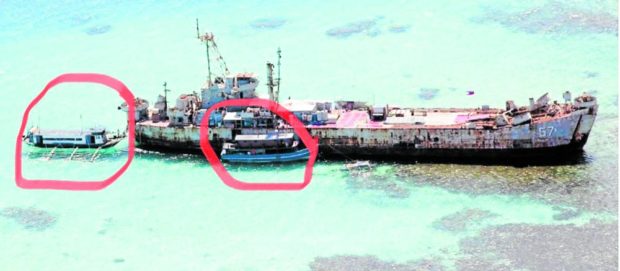
FINALLY An aerial photo shows the motorboats Unaiza Mae 1 and Unaiza Mae 3 finally reaching BRP Sierra Madre around noon on Tuesday with food and other supplies for the Marine detachment on the Navy ship used as a Philippine outpost at Ayungin (Second Thomas) Shoal in the West Philippine Sea, a week after they were blocked by the Chinese Coast Guard. —PHOTO FROM DEPARTMENT OF NATIONAL DEFENSE
MANILA, Philippines — China is not stopping its harassment and intimidation of Filipinos in the West Philippine Sea although its coast guard vessels did not stop two local boats carrying food and other supplies to the military detachment at Ayungin (Second Thomas) Shoal, according to Defense Secretary Delfin Lorenzana.
The military’s Western Command chief Vice Admiral Ramil Roberto Enriquez said the wooden-hulled Unaiza Mae 1 and Unaiza Mae 3 safely resupplied the BRP Sierra Madre at the shoal at around 11 a.m. on Tuesday.
The Sierra Madre, a World War II-era Navy ship which was intentionally marooned at the shoal to serve as an outpost in 1999, is being manned by a Marine detachment.
Unlike a week earlier when two Chinese Coast Guard ships blocked the two civilian boats while a third blasted them with a water cannon, damaging one and forcing both to abort their mission, there was “no untoward incident” during Tuesday’s supply run, Enriquez said.
But the Chinese made their presence felt at the shoal about three hours later, according to Lorenzana.
He told reporters in a text message that a Chinese Coast Guard ship sent three persons on a rubber boat near the Sierra Madre to take photos and videos while the supplies were being unloaded.
“I have communicated to the Chinese ambassador that we consider these acts as a form of intimidation and harassment,” he said.
Lorenzana said Ambassador Huang Xilian, who assured him that the China’s coast guard would not interfere with Tuesday’s supply mission, told him that he would inquire about his report.
Path to Pag-asa
Over the weekend, the Philippine Coast Guard (PCG)ship BRP Capones also monitored a Chinese Coast Guard vessel while heading to Pag-asa (Thitu) Island with fresh supplies and replacement troops.
The ship reached Pag-asa, the biggest island occupied by the Philippines in the Kalayaan Island Group, without incident, according to PCG spokesperson Commodore Armand Balilo.
Speaking on Monday at a meeting between leaders of the Association of Southeast Asian Nations and China, President Duterte said the Philippines “abhors” the Nov. 16 Ayungin Shoal incident as this “does not speak well” of the relations and partnership between Manila and Beijing.
On the same day, the six members of the Makabayan bloc in the House of Representatives filed a resolution to investigate the Chinese water cannon attack against the supply boats and urged Congress to condemn the latest display of China’s “increasing aggression and arrogance.”
“It is the duty of Congress to ensure that our territorial integrity is intact, local and international laws be honored and recognized, and more importantly, the safety and economic rights of our people are protected and ensured,” it said.
Neither the House nor the Senate, which are dominated by pro-Duterte lawmakers, has taken a collective stand on Chinese incursions or attacks against Filipinos in the West Philippine Sea since 2016.
Too late the protest?
Following the Ayungin incident, Foreign Secretary Teodoro Locsin Jr. strongly conveyed to Beijing Manila’s “outrage, condemnation and protest.”
In Malacañang, acting presidential spokesperson Karlo Nograles rejected criticisms that Manila’s protests were already too late in stopping Chinese expansion in the West Philippine Sea and that the President’s denunciation was intended to court political support in next year’s elections where he is running for a seat in the Senate.
“All those accusations are not true. The Department of Foreign Affairs acted swiftly, the President spoke about the issue [and as a result], our resupply boats reached Ayungin Shoal,” Nograles said.
Since taking office, the President has favored closer economic ties with China instead of asserting the July 2016 ruling of the international arbitral tribunal that invalidated Beijing’s claims to nearly all of the South China Sea, including the West Philippine Sea. He has repeatedly stressed that the Philippines could not afford to go to war with China.
Get other nations’ help
Former Foreign Secretary Albert del Rosario on Tuesday called on the government to get help from other countries to push for the enforcement of the July 2016 arbitral award.
In a statement, he welcomed the reaffirmation by the United States of its commitment under the Mutual Defense Treaty (MDT), which calls on both countries to come to each other’s aid in case of an armed attack.
The European Union, Australia, Japan, France, Germany and other countries also expressed serious concern over the incident.
Del Rosario said the Ayungin incident was also an opportunity to manifest the applicability of the MDT with the United States and reinforced the Philippines’ security posture in the South China Sea “by developing credible self-defense capabilities for our country and improving on our security alliances with other states which believe in the rule of law and in promoting peace and security in the region.”